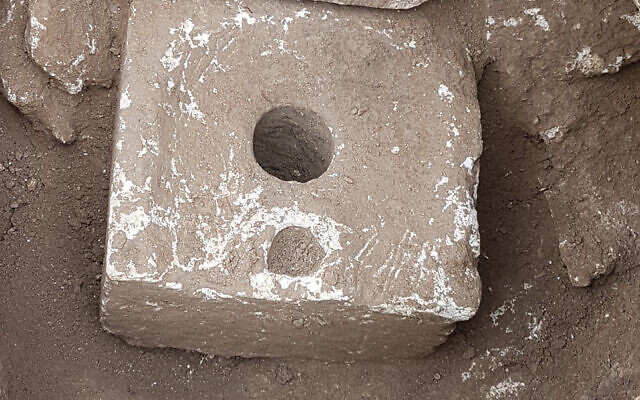Early toilets reveal dysentery in Old Testament Jerusalem
Examination of the latrines dating back to the biblical Kingdom of Judah uncovered traces of a common cause of debilitating diarrhoea in humans.

Analysis of ancient faeces taken from two toilets reveals dysentery in Old Testament Jerusalem.
Examination of the latrines dating back to the biblical Kingdom of Judah uncovered traces of a single-celled microorganism Giardia duodenalis – a common cause of debilitating diarrhoea in humans.
The findings are the oldest example of this diarrhoea-causing parasite infecting humans anywhere on the planet, the researchers lead by the University of Cambridge said.
Both toilets had carved stone seats almost identical in design – a shallow curved surface for sitting, with a large central hole for defecation and an adjacent hole at the front for male urination.
Study lead author Dr Piers Mitchell from Cambridge’s Department of Archaeology, said: “The fact that these parasites were present in sediment from two Iron Age Jerusalem cesspits suggests that dysentery was endemic in the Kingdom of Judah.”
He added: “Dysentery is a term that describes intestinal infectious diseases caused by parasites and bacteria that trigger diarrhoea, abdominal cramps, fever and dehydration.
“It can be fatal, particularly for young children.
“Dysentery is spread by faeces contaminating drinking water or food, and we suspected it could have been a big problem in early cities of the ancient Near East due to over-crowding, heat and flies, and limited water available in the summer.”
The samples came from the sediment underneath toilets found in two building complexes excavated to the south of the Old City.
They date back to the 7th century BCE when Jerusalem was a capital of Judah.
According to the experts, at the time Jerusalem would have been a flourishing political and religious hub estimated to have had between 8,000 and 25,000 residents.
Dr Mitchell said: “Toilets with cesspits from this time are relatively rare and were usually made only for the elite.”
One of the toilets was from a lavishly decorated estate at Armon ha-Natziv, surrounded by an ornamental garden.
The researchers suggest the site, excavated in 2019, probably dates from the days of King Manasseh, a client king for the Assyrians who ruled for 50 years in the mid-7th century.
While the site of the other toilet, known as the House of Ahiel, was a domestic building made up of seven rooms that was home to an upper-class family at the time.
Although its construction date is hard to pin down, some place it around the 8th century BCE.
Researchers feel more confident in dating its destruction, saying this happened in 586 BCE, when Babylonian ruler Nebuchadnezzar II brutally sacked Jerusalem for a second time, bringing to an end the Kingdom of Judah.
The researchers suggest ancient medical texts from Mesopotamia during the first and second millennium BCE describe diarrhoea affecting the populations of what is now the Near and Middle East.
Dr Mitchell explained: “These early written sources do not provide causes of diarrhoea, but they encourage us to apply modern techniques to investigate which pathogens might have been involved.
“We know for sure that Giardia was one of those infections responsible.”
The analysis of the two-and-a-half-thousand-year-old decomposed biblical-period faeces involved a technique called “ELISA”, in which antibodies bind onto the proteins uniquely produced by particular species of single-celled organisms.
The research, published in the Parasitology journal, was conducted through a collaboration between the University of Cambridge, Tel Aviv University, and the Israel Antiquities Authority.

Thank you for helping to make Jewish News the leading source of news and opinion for the UK Jewish community. Today we're asking for your invaluable help to continue putting our community first in everything we do.
For as little as £5 a month you can help sustain the vital work we do in celebrating and standing up for Jewish life in Britain.
Jewish News holds our community together and keeps us connected. Like a synagogue, it’s where people turn to feel part of something bigger. It also proudly shows the rest of Britain the vibrancy and rich culture of modern Jewish life.
You can make a quick and easy one-off or monthly contribution of £5, £10, £20 or any other sum you’re comfortable with.
100% of your donation will help us continue celebrating our community, in all its dynamic diversity...
Engaging
Being a community platform means so much more than producing a newspaper and website. One of our proudest roles is media partnering with our invaluable charities to amplify the outstanding work they do to help us all.
Celebrating
There’s no shortage of oys in the world but Jewish News takes every opportunity to celebrate the joys too, through projects like Night of Heroes, 40 Under 40 and other compelling countdowns that make the community kvell with pride.
Pioneering
In the first collaboration between media outlets from different faiths, Jewish News worked with British Muslim TV and Church Times to produce a list of young activists leading the way on interfaith understanding.
Campaigning
Royal Mail issued a stamp honouring Holocaust hero Sir Nicholas Winton after a Jewish News campaign attracted more than 100,000 backers. Jewish Newsalso produces special editions of the paper highlighting pressing issues including mental health and Holocaust remembrance.
Easy access
In an age when news is readily accessible, Jewish News provides high-quality content free online and offline, removing any financial barriers to connecting people.
Voice of our community to wider society
The Jewish News team regularly appears on TV, radio and on the pages of the national press to comment on stories about the Jewish community. Easy access to the paper on the streets of London also means Jewish News provides an invaluable window into the community for the country at large.
We hope you agree all this is worth preserving.





















